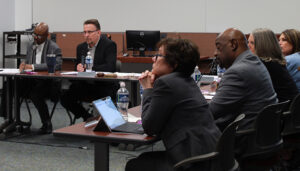After much consideration, the Board of Trustees passed a motion to increase in-county tuition rates by 4%.
Vice President of Finance and Administration Curtis Creagh announced a proposal from the administration in regards to MCCC’s policy on Tuition and Fees at the March 25 board meeting.
This proposal offered three different rates in which the college could increase tuition; these rates being 3%, 4% and 4.5%. The introduction of these rates was followed by a brief discussion of raising tuition rates to the maximum allowed by the Governor for this period, which would be 5%.
The rates offered were determined by the annual cost of attendance for resident and non-resident students, as well as those attending from out-of-state; the current rates as of this meeting were $124.54 for residents, $221.26 for non-residents and $246.48 for out-of-state.
“If we were to select Monroe’s rate of 4.5%, which is my recommendation, that would take us to $130.25 per credit hour,” Creagh said.

Mary Kay Thayer, trustee, followed his recommendation with her own and advocated for only a 3% increase.
“I’m really concerned with our students,” she said, “and this is per billable contact hour, so you’ve got your nursing students and some of those with labs that is gonna make this ridiculous.”
Affordability wasn’t the only point Thayer referenced, believing the board needed to take location into account as well.
“I would like to see non-resident and out-of-state be the same amount of tuition,” Thayer said.
Krista Lambrix, vice chair, agreed with Thayer.
“In our clinical groups from the college there’s a lot of students that live north of Monroe County,” Lambrix said. “I think it’s attractive to keep it the same. I would not continue to bump it, in fact I’d love to see it lower.”
President Kojo Quartey thanked Thayer for her recommendation and proceeded to list several ways in which students could alleviate the stress of tuition.
“We had a presidents meeting last week and I think we all know that the Governor has a recommendation now for free community college,” Quartey said. “We also have the Michigan achievement scholarship, we have reconnect 21+, and a host of other programs.”
He went on to note that a majority of students don’t take the opportunities offered to them, specifically the Michigan Achievement Scholarship, which he said amounts to almost free college, only saw 20 students who applied or received this scholarship for Fall 2023.
“We have scholarship money that goes unclaimed every year, so I think what we need to do here is to encourage students to apply for these scholarships,” Quartey said.
Chair Aaron Mason said many events depend on the board defining the tuition rate for fall, conveying the importance of approving tuition rates during this meeting due to Fall 2024 enrollment being near.
Mason opening final questions as well as comments on the motion allowed Lynette Dowler, trustee, to request clarification on the Governor’s plan for free community college. Quartey then answered that this plan had not yet been approved, but it has a high probability.
Dowler then inquired as to where MCCC stood in affordability in comparison to other community colleges within the state.
“We have worked very hard to be one of the most affordable community colleges in the state of Michigan,” Dowler said. “I’m not necessarily opposed to a 4.5% increase but I am concerned if it starts to put us above others.”
Creagh said this increase would leave MCCC as the 16th most affordable community college out of the 28 in Michigan, then moved on to discuss funding for the technology fees on account that HEERF, Higher Education Emergency Relief Fund, had funded most of MCCC’s software.
He reiterated his recommendation for a 4.5% increase in tuition, as well as adding an increase for the technology fee being $5 per billable contact hour and $2 per non-credit clock hour. Dowler modified the motion and proposed a 4% increase in tuition across all residences, and technology fees being increased by $4 per billable contact hour and $2 per non-credit clock hour which did not pass.
Lambrix then proposed a motion that resident tuition rates would be increased by 4% while both non-resident and out-of-state tuition would see no change, adding that technology fees would be increased by $4 for billable contact hours and $2 for non-credit clock hours.
This motion passed with five members in favor. Goodman and Thayer were the two who voted against.

